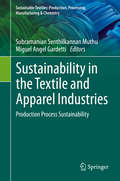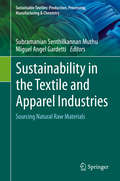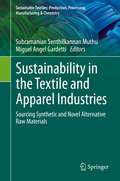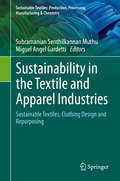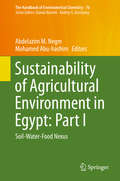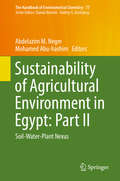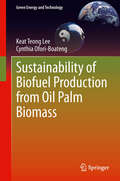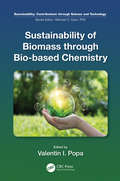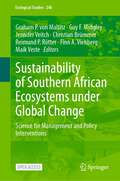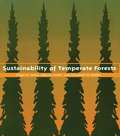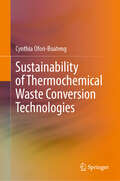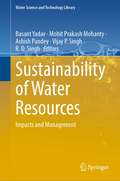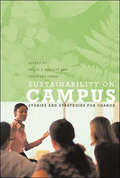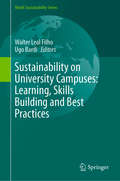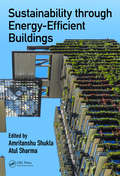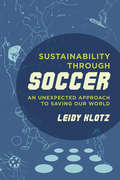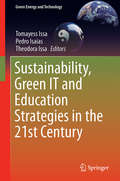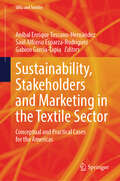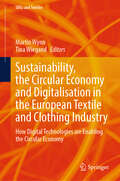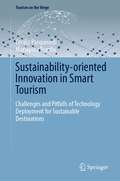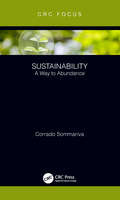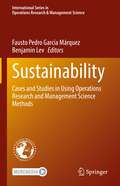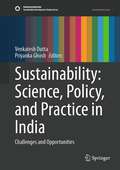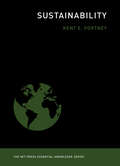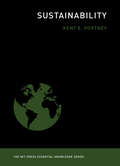- Table View
- List View
Sustainability in the Textile and Apparel Industries: Production Process Sustainability (Sustainable Textiles: Production, Processing, Manufacturing & Chemistry)
by Subramanian Senthilkannan Muthu Miguel Angel GardettiThis book is part of a five-volume set that explores sustainability in textile industry practices globally. Case studies are provided that cover the theoretical and practical implications of sustainable textile issues, including environmental footprints of textile manufacturing, consumer behavior, eco-design in clothing and apparels, supply chain sustainability, the chemistry of textile manufacturing, waste management and textile economics. The set will be of interest to researchers, engineers, industrialists, R&D managers and students working in textile chemistry, economics, materials science, and sustainable consumption and production.This volume addresses the technologies and mechanical processes of textile production, and what sustainable methods can be employed to achieve improved safety and environmental health. The book covers sustainable aspects of printing, dyeing, coloration, weaving, knitting, tailoring, surface design and antimicrobial finishing for environmentally friendly textile and apparel products.
Sustainability in the Textile and Apparel Industries: Sourcing Natural Raw Materials (Sustainable Textiles: Production, Processing, Manufacturing & Chemistry)
by Subramanian Senthilkannan Muthu Miguel Angel GardettiThis book is part of a five-volume set that explores sustainability in textile industry practices globally. Case studies are provided that cover the theoretical and practical implications of sustainable textile issues, including environmental footprints of textile manufacturing, consumer behavior, eco-design in clothing and apparels, supply chain sustainability, the chemistry of textile manufacturing, waste management and textile economics. The set will be of interest to researchers, engineers, industrialists, R&D managers and students working in textile chemistry, economics, materials science, and sustainable consumption and production. This volume comprehensively covers the various sustainable natural materials used in textiles that originate from raw materials sourcing. The book discusses agricultural production systems and standards for the development of sustainable textile fibers, the effects of chemical surface modification methods on the properties of textile fibers, and how antibacterial and antifungal textiles can be manufactured using natural resources.
Sustainability in the Textile and Apparel Industries: Sourcing Synthetic and Novel Alternative Raw Materials (Sustainable Textiles: Production, Processing, Manufacturing & Chemistry)
by Subramanian Senthilkannan Muthu Miguel Angel GardettiThis book is part of a five-volume set that explores sustainability in textile industry practices globally. Case studies are provided that cover the theoretical and practical implications of sustainable textile issues, including environmental footprints of textile manufacturing, consumer behavior, eco-design in clothing and apparels, supply chain sustainability, the chemistry of textile manufacturing, waste management and textile economics. The set will be of interest to researchers, engineers, industrialists, R&D managers and students working in textile chemistry, economics, materials science, and sustainable consumption and production. This volume explores some alternative synthetic raw materials resulting from the recycling and regeneration of renewable textile fibers, and how these sustainable green-based composites can contribute to improved ecological and human health. The book offers insights into the impacts of human-made fibers and microfiber pollution, and how biodegradable material sourcing can help to curb harmful environmental impacts from these practices and achieve clothing and apparel sustainability.
Sustainability in the Textile and Apparel Industries: Sustainable Textiles, Clothing Design and Repurposing (Sustainable Textiles: Production, Processing, Manufacturing & Chemistry)
by Subramanian Senthilkannan Muthu Miguel Angel GardettiThis book is part of a five-volume set that explores sustainability in textile industry practices globally. Case studies are provided that cover the theoretical and practical implications of sustainable textile issues, including environmental footprints of textile manufacturing, consumer behavior, eco-design in clothing and apparels, supply chain sustainability, the chemistry of textile manufacturing, waste management and textile economics. The set will be of interest to researchers, engineers, industrialists, R&D managers and students working in textile chemistry, economics, materials science, and sustainable consumption and production. This volume discusses novel trends and concepts in sustainable textile design, including innovative topics such as doodling and upcycling in clothing and apparel design for sustainable fashion initiatives. Along with strategies for repurposing fashion sustainability, the book also covers university interventions for the development of proper and environmentally friendly design practices. Specific technologies addressed include UV applications, laser treatments for dyeing, refined surface design techniques for products such as leather.
Sustainability of Agricultural Environment in Egypt: Soil-Water-Food Nexus (The Handbook of Environmental Chemistry #76)
by Abdelazim M. Negm Mohamed AbuhashimThis volume discusses the sustainability of Egypt’s agriculture and the challenges involved. It provides a comprehensive review and the latest research findings, and covers a variety of topics under the following themes: · Applicability of sustainable agriculture in Egypt · Sustainable agriculture under water scarcity and polluted soil environments · Improved crop productivity using a variety of tried and tested procedures · Biotechnology application for agricultural sustainability and food security · Potentiality of soil-sensing for a more sustainable agricultural environment The volume closes with a summary of the key conclusions and recommendations from all chapters. Together with the companion volume Sustainability of Agricultural Environment in Egypt: Part II, it offers an essential source of information for postgraduate students, researchers, and stakeholders alike.
Sustainability of Agricultural Environment in Egypt: Soil-Water-Plant Nexus (The Handbook of Environmental Chemistry #77)
by Abdelazim M. Negm Mohamed Abu-HashimThis volume discusses the sustainability of Egypt’s agriculture and the challenges involved. It provides a comprehensive review and the latest research findings, and covers a variety of topics under the following themes: · Integrated natural resources management for sustainable production · Integrated biopesticides and biofertilizers for sustainable agriculture · Integrated plant and animal production for a sustainable food supply · Policies for sustainable agriculture in Egypt The volume closes with a summary of the key conclusions and recommendations from all chapters. Together with the companion volume Sustainability of Agricultural Environment in Egypt: Part I, it offers an essential source of information for postgraduate students, researchers, and stakeholders alike.
Sustainability of Biofuel Production from Oil Palm Biomass
by Cynthia Ofori-Boateng Keat Teong LeeThis book evaluates and discusses the main sustainability challenges encountered in the production of biofuel and bio-products from oil palm biomass. It starts off with the emphasis on oil palm production, oil palm products recovery and oil palm wastes utilization. The simultaneous production of these bio-products for sustainable development is discussed. This is followed by the key factors defining the sustainability of biofuel and bio-product production from oil palm biomass. The environmental issues including ecological, life cycle assessment and environmental impact assessment of oil palm plantation, milling and refining for the production of biofuels and bio-products are presented. Socio-economic and thermodynamic analysis of the production processes are also evaluated using various sustainability assessment tools such as exergy. Lastly, methods of improving biofuel production systems for sustainable development are highlighted.
Sustainability of Biomass through Bio-based Chemistry (ISSN)
by Valentin I. PopaThe process of photosynthesis is a potential source of energy and bioproducts. Renewable sources of polymeric materials offer an answer to maintaining sustainable development of economically and ecologically attractive technology. The innovations in the development of materials from biopolymers, preservation of fossil-based raw materials, complete biological degradability, reduction in the volume of garbage and compostability in the natural cycle, climate protection through reduction of carbon dioxide released, and the application possibilities of agricultural resources for the production of bio/green materials are some of the reasons why such materials are attracting public interest.FEATURES Discusses waste from urban areas, forestry and agricultural processes, specifically grown crops such as trees, starch crops, sugar crops hydrocarbon plants and oils, and finally aquatic plants such as water seaweeds and algae, which can be used as raw materials for sustainable development. Presents recent advances in the development of some specifically chemical components of biomasses for a sustainable future. Focuses on lignocellulose as a source of bio-based products. Draws upon expertise from various countries. Describes how upgraded and integrated biomass processing may reduce the risks associated with the COVID-19 pandemic. Valentin I. Popa is professor emeritus of Wood Chemistry and Biotechnology at Gheorghe Asachi Technical University of Iasi, Romania.
Sustainability of Southern African Ecosystems under Global Change: Science for Management and Policy Interventions (Ecological Studies #248)
by Maik Veste Graham P. von Maltitz Guy F. Midgley Jennifer Veitch Christian Brümmer Reimund P. Rötter Finn A. ViehbergThis open access book about the sustainability of marine and terrestrial ecosystems in southern Africa provides a synthesis of the research program Science Partnerships for the Adaptation to Complex Earth System Processes (SPACES II, 2018-2022). It addresses the scientific, social, and economic issues related to climate change, its potential impacts on the various ecosystems, adaptations, and management interventions for enhancing systems resilience in Southern Africa. It is written by numerous scientists from African states and Germany and summarizes the latest research findings, which are of great relevance for a better understanding of climate change impacts, adaptations, and vulnerabilities as well as for developing management options and policy options to reduce the associated risks. This is crucial considering that the projected African population increase is exceptional. Furthermore, climate change is assumed to hit southern Africa extremely hard with a significant increase in extreme events and the frequency of severe droughts, heat waves, and flooding. Southern Africa hosts a high variety of ecosystems, which belongs to important biodiversity hotspots for unique flora and fauna. The surrounding oceans form, in turn, a bottle neck within the ocean’s global thermohaline circulation, act as a still poorly understood carbon sink and source and play an important role for fisheries as they are highly productive. Considering these important aspects, the book is an important interdisciplinary contribution to the scientific literature and will find a wide readership.The book is aimed at students, teachers, and scientists in the fields of terrestrial and marine ecology, environmental, nature and landscape planning, agriculture, environmental and resource management, biodiversity, and nature conservation, as well as scientists and representatives in specialised authorities and associations, nature conservationists, and policy makers of related disciplines.
Sustainability of Temperate Forests
by Roger A. Sedjo Alberto Goetzl Stevenson O. MoffatRFF's Roger Sedjo and his colleagues discuss initiatives designed to promote and enhance sustainable forestry in temperate countries. While concerns about tropical deforestation are considerable, temperate forests account for the vast majority of the world's roundwood production and most global trade in wood and paper. Improving forest sustainability in such regions is imperative, economically and environmentally. This book illustrates how far nations have progressed, and how far they still need to go, in that effort. The authors describe how temperate nations address forest sustainability, discussing recent developments affecting forestry and trade. Their compilation of international data on forest practices and regulation provides a useful comparative perspective. They analyze the effect of institutional changes (e.g., new laws) on land management. The volume assesses how national forestry industries are adapting to new laws and policies in the face of new realities in production and markets, particularly in the context of international trade and global competition. Country profiles provide details on sustainability policy and performance in eight timber-exporting or major wood-using temperate nations: the United States, Canada, Finland, Sweden, Germany, France, New Zealand, and Chile. The authors also assess how each nation would be affected by the application of various criteria for sustainability.
Sustainability of Thermochemical Waste Conversion Technologies
by Cynthia Ofori-BoatengThis book elaborates on the sustainability of biofuels and biochemicals production via thermochemical conversion pathways. Sustainability encompasses the social, economic, environmental, political, and thermodynamic efficiencies of a production technology. Assessing the sustainability of wastes conversion pathways would help pinpoint inefficiencies hence improving the process economically, environmentally, and thermodynamically. This book discusses the major sustainable potential feedstocks/waste for thermochemical conversion into bioproducts such as biodiesel and bioelectricity. Though there exist many pathways for thermochemical waste conversion (such as combustion, gasification, and pyrolysis) which operate on laboratory, pilot and commercial scales, their sustainability indices are scarce as there exist few sustainability assessment tools to help pinpoint inefficiencies. This book assesses the sustainability of various types of thermochemical conversion pathways using technoeconomic analysis as well as exergetic life cycle assessment tools. Common sustainability issues and the way forward for sustainable thermochemical wastes conversion into bioproducts are detailed in this book. For overall sustainability, thermochemical waste conversion process development alternatives are also discussed in this book. Given its scope, this is a valuable resource for renewable energy policy makers, bioprocess researchers in academia and related industries, students studying in the fields of Green Chemistry, Chemical and Mechanical Engineering as well as the general publics who have great interest in biofuels for sustainable development. Almost all books on thermochemical biomass conversion address only the process and new technologies, but few tend to address the technical and thermodynamic issues pertaining to sustainability due to the use of fossil fuel in the manufacturing process. This book bridges this knowledge gap, and subsequently outlines specific exergetic improvement options for biofuel and biochemicals production which is scarce in literature. This book assesses the sustainability of bioprocess technologies in a more concise manner for students to understand and apply the knowledge in their future engineering careers.
Sustainability of Water Resources: Impacts and Management (Water Science and Technology Library #116)
by Vijay P. Singh Ashish Pandey R. D. Singh Basant Yadav Mohit Prakash MohantyThis book covers a wide spectrum of water resources management, including water supply and demand, operation and maintenance of water distribution systems, water quality assessment, impacts of climate change on hydrological extremes, and water governance. Rapid urbanization, industrialization, and population growth are the major factors contributing to a significant rise in water demands across all the sectors in India. Although the Indian Summer Monsoon Rainfall contributes primarily to the available surface and groundwater resources, recurrent non-uniform/erratic rainfall events have resulted in widespread water scarcity. On many occasions, extreme meteorological conditions trigger the severity of water-related disasters such as floods and droughts. The untreated wastewater from domestic and industrial sources discharged through un-engineered means, adds to the issue as it ends up polluting the surface and groundwater resources.
Sustainability on Campus: Stories and Strategies for Change (Urban and Industrial Environments)
by Peggy F. Barlett Geoffrey W. ChaseStories both practical and inspirational about environmental leadership on campus.These personal narratives of greening college campuses offer inspiration, motivation, and practical advice. Written by faculty, staff, administrators, and a student, from varying perspectives and reflecting divergent experiences, these stories also map the growing strength of a national movement toward environmental responsibility on campus.Environmental awareness on college and university campuses began with the celebratory consciousness-raising of Earth Day, 1970. Since then environmental action on campus has been both global (in research and policy formation) and local (in efforts to make specific environmental improvements on campuses). The stories in this book show that achieving environmental sustainability is not a matter of applying the formulas of risk management or engineering technology but part of what the editors call "the messy reality of participatory engagement in cultural transformation."In Sustainability on Campus campus leaders recount inspiring stories of strategies that moved eighteen colleges and universities toward a more sustainable future. This book is for faculty, students, administrators, staff, and community partners, whether hesitant or committed, knowledgeable or newcomer. Scholars and activists have recognized the crucial role that higher education can play in the sustainability effort, and each chapter in the book is full of ideas about how to get started, revitalize efforts, and overcome roadblocks. Human and at times joyful, these stories illustrate many forms of leadership, in new courses and faculty development, green buildings and administrative policies, student programs, residential life, and collaborations with local communities.
Sustainability on University Campuses: Learning, Skills Building and Best Practices (World Sustainability Series)
by Ugo Bardi Walter Leal FilhoThe implementation of sustainability initiatives on campuses is an essential component of promoting sustainability in the higher education context. In addition to reflecting an awareness of environmental issues, campus programmes demonstrate how seriously universities take sustainability at the institutional level.There is a lack of truly interdisciplinary publications that comprehensively address the issue of campus greening, and there is an even greater need for publications that do so at a truly international level. This book meets these needs. It is one of the outcomes of the “Second Symposium on Sustainability in University Campuses” (SSUC-2018), which was jointly organised by the University of Florence (Italy), Manchester Metropolitan University (UK), the Research and Transfer Centre “Sustainable Development and Climate Change Management” and the “European School of Sustainability Science and Research” at the Hamburg University of Applied Sciences (Germany), in cooperation with the Inter-University Sustainable Development Research Programme (IUSDRP).The book showcases examples of campus-based research and teaching projects, regenerative campus design, low-carbon and zero-carbon buildings, waste prevention, and resilient transport, among others. Ultimately, it demonstrates the role of campuses as platforms for transformative social learning and research, and explores the means by which university campuses can be made more sustainable.The aims of this publication are as follows:• to provide universities with essential information on campus greening and sustainable campus development initiatives from around the world;• to share ideas and lessons learned in the course of research, teaching and projects on campus greening and design, especially successful initiatives and good practice; and• to introduce methodological approaches and projects intended to integrate the topic of sustainable development in campus design and operations.This book gathers contributions from researchers and practitioners in the field of campus greening and sustainable development in the widest sense, from business and economics, to the arts, administration and the environment, and hailing from Europe, Latin America, North America and Asia.
Sustainability through Energy-Efficient Buildings
by Amritanshu Shukla and Atul SharmaThe book covers chapters ranging from introduction to recent technological challenges, case studies of energy-efficient buildings with policy and awareness issues, fundamentals and present status along with research updates and future aspects on topics focusing on energy-efficient construction, materials Provides comprehensive information on energy efficient buildings including policy and energy audit aspects with case studies Examines application of PCMs in passive heating and cooling in buildings; role of active TES and energy saving potential
Sustainability through Soccer: An Unexpected Approach to Saving Our World
by Leidy KlotzIn the quest for sustainability, we strive to meet our present needs without sacrificing the same opportunity for future generations. Our success or failure depends on our ability to think in "systems," integrating environmental, social, and economic considerations. But how do we learn systems-thinking? In a series of engaging, rapid-fire stories, Sustainability through Soccer takes readers on a journey through a progression of systems-thinking and sustainability concepts. Using the beautiful game of soccer as an analogy, Leidy Klotz illuminates real-world interdependencies (such as between climate change and human rights), building the chain of concepts in a fun, accessible way. Soccer nerds and newbies alike will be entertained on the way to a deeper understanding of sustainability science.
Sustainability, Green IT and Education Strategies in the Twenty-first Century
by Pedro Isaias Tomayess Issa Theodora IssaThis work presents and discusses the latest approaches and strategies for implementing Sustainability and Green IT into higher education and business environments. Following the global financial crisis in 2007/2008, businesses began to struggle coping with the increased IT/IS cost and their environmental footprint. As a consequence, action by universities to incorporate sustainability and ‘Green IT’ as parts of their teaching and learning materials, acknowledging their importance for global and local businesses, is being increasingly implemented. The book addresses the cooperation and coordination between academics and practitioners needed in order to achieve the changes required to obtain sustainability.Intended for researchers, lecturers and post-graduate students, as well as professionals in the Information Society and ICT and education sectors, and policy makers.
Sustainability, Stakeholders and Marketing in the Textile Sector: Conceptual and Practical Cases for the Americas (SDGs and Textiles)
by Aníbal Enrique Toscano-Hernández Saúl Alfonso Esparza-Rodríguez Gabino García-TapiaGeospatial analysis of the Sustainable Value Chain in the Textile sector of the United States.- Sustainable practices in the textile sector: Case study of the global value chain of the American economies.- Exploring eco-innovation performance in the textile industry: Case of two export-oriented Colombian firms.- Transformational and sustainable leadership in textile companies in Lima: a qualitative study.- Obstacles to innovation in textile SMEs in the Usaquen district of Bogota, Colombia 100 Reverse Logistics: A view from green capitalism and circular economy in textile companies in Mexico.- Green marketing strategies in sustainable fashion business models.- Green marketing and its contribution to the competitiveness of the textile and apparel sector. Case study in Cali.- The green swan´s theory and circular economy and it’s influence in regenerative capitalism.- Competitiveness of decent work of the us textile sector using a multivariable classification of the sdg 8 target 5: full employment and decent work.- Critical evaluation of successful strategies for sustainable manufacturing in the textile sector and their impact on the sustainable development goals: Case studies in Colombia.
Sustainability, the Circular Economy and Digitalisation in the European Textile and Clothing Industry: How Digital Technologies are Enabling the Circular Economy (SDGs and Textiles)
by Martin Wynn Tina WiegandThis book investigates the nature of the European textile and clothing industry, focusing on the relationship between sustainability practices, the transition to the circular economy and the deployment of digital technologies. It provides a profile of the industry in a range of European countries, allowing comparisons and contrasts, and the formulation of recommendations for future change and development. A mainly inductive, qualitative research approach is used, in which both secondary sources and primary interview and survey material are analysed to address key research questions, and support the development of a model for the assessment of companies in their transition to the circular economy, incorporating both upstream and downstream activities in the extended supply chain. The book will be of value to undergraduate and postgraduate students in environmental and computer technology disciplines, and to professionals and practitioners in the textile and clothing industry.
Sustainability-oriented Innovation in Smart Tourism: Challenges and Pitfalls of Technology Deployment for Sustainable Destinations (Tourism on the Verge)
by Cecilia Pasquinelli Mariapina TrunfioThis book combines research on technology-driven and social-driven innovation in tourism destinations and the multifaceted concept of sustainability, providing an integrative understanding of the nexus between smartness and sustainability within destinations. It engages theoretically and empirically with the research question of how, and to what extent, smart technologies drive tourism innovation focussed on sustainability. Although innovation and technology are widely considered the way to sustainable tourism growth, further studies need to size the role of technology and critically address modalities, challenges, opportunities and pitfalls of technology deployment in rebalancing tourism disequilibria within local systems. Local, national, and supranational policymakers’ attention to technology investments, the widening technological frontiers, and the enthusiasm for new technological opportunities to build, manage, and market destinations suggest the relevance of this research agenda. This book provides scholars, postgraduate students, and practitioners with conceptual and empirical insights into smart solutions and innovative destination models for multi-stakeholder engagement to manage and address tourism impacts and imbalances. The book outlines scenarios of sustainability-oriented innovation, encompassing and intertwining technological, social, human, and cultural co-drivers as the necessary conditions for smart technologies to enhance sustainable destinations effectively and improve human wellbeing and societal development.
Sustainability: A Way to Abundance
by Corrado SommarivaThe book describes mechanisms whereby the Earth naturally thrives towards energy and resources abundance and how unsustainable industrial practices alter this trend. Introduces the concept of earth energy and associates this to the conditions of the biosphere and emphasizes the possibilities with inexpensive wind and solar energy Provides a good quantification of the concepts of sustainability and its effects on the environmentn and critical analysis and updates to the relationships between the environmental impact, affluence and technology
Sustainability: Cases and Studies in Using Operations Research and Management Science Methods (International Series in Operations Research & Management Science #333)
by Fausto Pedro García Márquez Benjamin LevThis book provides relevant theoretical frameworks and the latest empirical research findings in Operations Research (OR) and Management Science (MS) as applied to sustainability. Its goal is to identify and describe ways in which OR and MS have been applied to and influenced the development of sustainability. Many of the issues we face today stem from the interconnectivity of the economy, society, and the environment, and from how both the economy and society are affecting the environment. In response, there have been a range of local and global efforts to advance society without harming the natural environment. The book showcases how OR/MS can help to address these issues, specifically with regard to renewable energy, smart industry, smart cities, transportation, smart homes and devices, etc. This book is intended for professionals in the fields of energy, engineering, information science, mathematics and economics, and for researchers who wish to develop new skills in connection with sustainability, or whose work involves sustainability.
Sustainability: Challenges and Opportunities (Sustainable Development Goals Series)
by Venkatesh Dutta Priyanka GhoshThis book is an interdisciplinary work that reveals the contemporary sustainability narratives in India within the context of various SDGs. Several case studies are presented, each of which sheds light on the challenges and constraints that are impeding the process of achieving SDGs and investigates potential long-term answers to socio-economic and environmental issues. Through empirical case studies from different parts of India, the book explores the current status of achieving sustainable development goals in India. The volume immensely benefits scientists, researchers, policymakers and practitioners as it offers a thematic and comprehensive understanding of challenges associated with mainstreaming SDGs at national, sub-national, and micro scales in India.
Sustainability: Creating The Green Metropolis (MIT Press Essential Knowledge series)
by Kent E. PortneyA concise and accessible examination of sustainability in a range of contemporary contexts, from economic development to government policy.The word “sustainability” has been connected to everything from a certain kind of economic development to corporate promises about improved supply sourcing. But despite the apparent ubiquity of the term, the concept of sustainability has come to mean a number of specific things. In this accessible guide to the meanings of sustainability, Kent Portney describes the evolution of the idea and examines its application in a variety of contemporary contexts—from economic growth and consumption to government policy and urban planning.Portney takes as his starting point the 1987 definition by the World Commission on Environment and Development of sustainability as economic development activity that “meets the needs of the present without compromising the ability of future generations to meet their own needs.” At its heart, Portney explains, sustainability focuses on the use and depletion of natural resources. It is not the same as environmental protection or natural resource conservation; it is more about finding some sort of steady state so that the earth can support both human population and economic growth. Portney looks at political opposition to the promotion of sustainability, which usually questions the need for sustainability or calls its costs unacceptable; collective and individual consumption of material goods and resources and to what extent they must be curtailed to achieve sustainability; the role of the private sector, and the co-opting of sustainability by corporations; government policy on sustainability at the international, national, and subnational levels; and how cities could become models for sustainability action.
Sustainability: Creating The Green Metropolis (The MIT Press Essential Knowledge series)
by Kent E. PortneyA concise and accessible examination of sustainability in a range of contemporary contexts, from economic development to government policy.The word “sustainability” has been connected to everything from a certain kind of economic development to corporate promises about improved supply sourcing. But despite the apparent ubiquity of the term, the concept of sustainability has come to mean a number of specific things. In this accessible guide to the meanings of sustainability, Kent Portney describes the evolution of the idea and examines its application in a variety of contemporary contexts—from economic growth and consumption to government policy and urban planning.Portney takes as his starting point the 1987 definition by the World Commission on Environment and Development of sustainability as economic development activity that “meets the needs of the present without compromising the ability of future generations to meet their own needs.” At its heart, Portney explains, sustainability focuses on the use and depletion of natural resources. It is not the same as environmental protection or natural resource conservation; it is more about finding some sort of steady state so that the earth can support both human population and economic growth. Portney looks at political opposition to the promotion of sustainability, which usually questions the need for sustainability or calls its costs unacceptable; collective and individual consumption of material goods and resources and to what extent they must be curtailed to achieve sustainability; the role of the private sector, and the co-opting of sustainability by corporations; government policy on sustainability at the international, national, and subnational levels; and how cities could become models for sustainability action.
